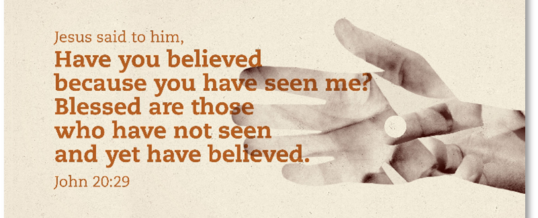
This gospel reading is one of the more familiar gospel stories for all of us. I’ve read books and heard homilies–commentaries you might say–about the “Doubting Thomas” story. After hearing these commentaries, sometimes I felt not so bad in my own faith, especially when I compared myself with the sad state of Thomas at the beginning of the story. Contrastingly, at other times, I felt my faith needed a lot of stretching and growing, especially when I compared myself to Thomas at the end of the story when he professes, “My Lord and my God!” One thing I’ve learned is that it’s not very helpful to compare one person’s faith journey with another person’s. Whenever I get into the comparison game, I’ll either get the “fat head syndrome” because I feel I’m so much further advanced than others, or I’ll feel disappointed with myself because as others are crossing the finish line, I’m still at the start line tying my shoes and waiting for the gun to go off. The goal in the spiritual life is not to use anyone else as a measuring stick. The goal in the spiritual life is simply to try to be faithful every day to what God is calling each of us to. That’s why it’s hard to criticize anyone. Everyone here is doing their best. Even Thomas, 2000 years ago, was doing his best.
When Jesus appeared, in his risen state for the second time in the Upper Room, Thomas that time was present. Jesus knew Thomas’ struggle, and so he said, “Thomas, reach out your hand and put it in my side.” There is no indication in this story that Thomas actually did what Jesus invited him to do. Perhaps that’s Thomas’ salvation, that he finally doesn’t need empirical proof, he doesn’t have to put his hands in Christ’s wounds, in order to believe. Now, it also doesn’t say–but I think this really happened–that Thomas was able to touch his own wounds. The ability for Thomas to get in touch with his own woundedness is key to his ability to accept and believe that his “Lord and God” is also the Wounded One in his midst. Without accepting his own wounds, I doubt Thomas would have been able to draw close to Jesus in his woundedness. An example from my own life may be helpful but know this is also true of all of us.
When I visit someone in the hospital or bend my ear to someone’s experience of pain in their life, I can only stay in that conversation to the degree that I have come to terms with pain in my own life. If I have not done my own homework, that is, if I have not accepted that suffering is part of my life, then when another person shares their pain, my tendency will be to change the subject and talk about last night’s hockey game.
Nadia Bolz-Weber, an American minister says it well in one of her books. She writes: After the resurrection, Jesus presented his wounds to his grieving friends. John 20:20 says, “Jesus came and stood among his disciples and said, ‘Peace be with you.’” She go on to write, “Isn’t that true for us as well? We can only know and be known when we show how life has marked us. I never really feel a connection to someone until they have shared with me the lumpy, broken, or even petty parts of themselves. Our pain and failure—the things we so often try to hide, the things that create shame, the things that scar—are what give us texture. And without texture, there is nothing for others to connect to.”
I think she is right. Whenever someone dares to share something about their own woundedness, their own vulnerability, their own faults, flaws, and stupidity, I immediately want to do the same for them. It’s like we are given permission to verbalize to the other what we all know to be true anyways: that we are all human, we are all flawed, we have all been hurt and have hurt others in the game of love, and we are all in need of healing and wholeness.
Perhaps, Jesus, by showing up with his own wounds and daring to be vulnerable in front of the Apostles, gave Thomas permission to let down his guard and be vulnerable in front of Jesus as well. In that moment a new relationship was made possible. Until then, Thomas would not let down his guard. In fact, you might say he was leading a guarded life. Until then Thomas was stubborn, obstinate, and anything but open. Who can blame him? When we feel burned in the game of love, as Thomas must have felt, our knee-jerk reaction is to guard ourselves against further pain.
Isn’t it interesting that healing and faith come about, in this story, not because a superhero showed up with superhero strength and saved the day with pure power. It was just the opposite. A vulnerable and hurting man encounters someone who is not afraid to appear in his own wounds and vulnerability and healing comes about. It’s not the way I would have scripted it. But then again God’s ways are above my ways…way above. God’s ways turn the world upside down. The first become last, and the last become first. Thomas who refuses to believe the story of his brother apostles, Thomas who demands personal experience before he’ll believe even Jesus himself, goes on to give his life for the gospel and established the faith in India. Thomas, who struggled mightily to believe, becomes the source of belief for countless others. And all of this comes not through strength but through weakness and vulnerability.
Your story and my story are not written in this book, but when we dare to be vulnerable in front of each other a funny thing happens…we find life in Jesus’ name.
Fr. Phil Mulligan
APR
2023

About the Author: